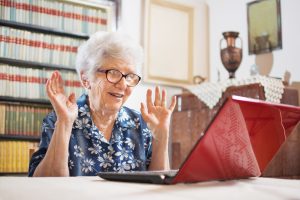GRE From Home: Get into law school from the comfort of your home.
More Law Firm Layoffs: COVID-19 rears its ugly head again.
Hilarious Filing: But he’s not wrong.
Unicorn Case Gets Ugly: Benchslapped!
GRE From Home: Get into law school from the comfort of your home.
More Law Firm Layoffs: COVID-19 rears its ugly head again.
Hilarious Filing: But he’s not wrong.
Unicorn Case Gets Ugly: Benchslapped!

Despite a major Biglaw merger in 2018, what firm saw a dip of 3.4 percent in revenue to $869.1 million for 2019?
Hint: Firm leadership said the decline was not unexpected and that firm was focused on more positive matrices, including that in the 21 months since the merger became official, there was a 5 percent increase in combined profits over 2018, and the firm finished 2019 with a positive cash balance of $86 million.
See the answer on the next page.
I’m always looking at new technology because, well, that’s part of what I do. Whether it’s for myself, someone else, or for the benefit of the legal community, when I see new technology that catches my attention, I like to share it because I think it’s part of the responsibility that comes with having a platform to communicate to the legal operations community.
So, last week I spent some time talking with Ian Campbell, president and CEO of iCONECT. I’ve mentioned the iCONECT platform here before in a different context. But now, fresh off a cash infusion, Campbell’s team has ramped up development. They recently released version 10 and at a time when software and service providers are moving to the cloud, iCONECT has chosen to let the customer decide where to implement their platform. iCONECT v10 is available both in the cloud through a network of vendors or behind the firewall for in-house deployment.
I’ve used the iCONECT platform in the past. I even tried to get certified in it. Campbell showed me the platform himself, touting that beyond the faster HTML5 interface are new optimizations and enhancements below the waterline too. I thought it may be useful to review some of the new features.
First is iCONECT’s new drag-and-drop ingestion/processing, called Self Serve. It enables users to import native files by simply dropping the files or pasting a link into the platform, and the embedded processing engine goes to work converting them, extracting the metadata and text. Self Serve also works really well with incoming productions from LAW, Ipro, and Relativity.
Next, and really useful for those with documents sets containing lots of personally identifiable information (PII), is a module iCONECT is calling COVER. This is a game changer, in my view. COVER allows for the mass-redaction of PII on a scale I haven’t seen yet. What’s cool is that users can set up templates for different jurisdictions of PII, allowing license, social security, or phone numbers from multiple countries to be “covered.” The module is powered by Ayfie’s entity identification engine, and it’s possible to identify PII on ingestion. You can tag and folder the documents to keep them organized, and prior to production users can redact all that PII in one fell swoop. It also works with word lists, allowing, for example, a pharma company to mass-redact proprietary chemical combinations in documents. Very cool!
Also new to the iCONECT platform is Oversight, a Sentio-powered automated quality-control feature used during manual document review. In much the same way that banks and credit card companies are able to identify unusual purchase activity that might trigger a fraud alert, iCONECT’s Oversight tracks how document reviewers code documents, and it quickly and automatically identifies anomalies in coding that appear to be inconsistent based on previous coding activity and sets them aside for further review. It’s a great way to have “oversight” into review quality.
Version 10 also introduces continuous active learning (CAL) in the iCONECT platform. Here, users index the text of documents, run some keywords or feed some example documents, and the platform starts feeding the most relevant documents to review with subsecond response time.
Beyond iCONECT’s unique ability to manage video and audio files without third-party tools or plug-ins is their cool new table and thumbnail feature in the document list which enables users to click on a thumbnail rendering of a file to enlarge it. A great way to quickly find that document “with the blue diagram on it.” A huge timesaver.
Their ‘SelfServe’ ingestion/processing component is just one of the template-driven optimizations for project managers. Tag panels, field structures, security profiles, and productions can all be created, then saved as a template allowing for granular and complex workflows to be saved as nothing more than a one-click template for non-PM users.
iCONECT has always been a company that not only meets market need, they have a way of looking over the horizon helping law firms, vendors, and corporations make pragmatic decisions on both their technology direction and on what software review platform they should partner with for the longer term.
Hats off to Ian and the iCONECT development team for again introducing an iCONECT version that sets a new bar.

Mike Quartararo
Mike Quartararo is the President of the Association of Certified E-Discovery Specialists (ACEDS), a professional member association providing training and certification in e-discovery. He is also the author of the 2016 book Project Management in Electronic Discovery and a consultant providing e-discovery, project management and legal technology advisory and training services to law firms and Fortune 500 corporations across the globe. You can reach him via email at mquartararo@aceds.org. Follow him on Twitter @mikequartararo.

Sorry to Granny and the other 28 million Americans age 65 and older, but if it’s you or the economy, lots of Republicans are going with the GDP. Last night, Texas’s Lieutenant Governor Dan Patrick captured the gestalt, telling Fox’s Tucker Carlson that he’s “all in” only grandparents sacrificing themselves to preserve the American economy for the “grandchildren, that [] we all care about and [] we love more than anything.”
“No one reached out to me and said, ‘As a senior citizen, are you willing to take a chance on your survival in exchange for keeping the America that all America loves for your children and grandchildren?’” Patrick explained, as he urged Americans to throw in the towel and cut out that sissy social distancing. “If that’s the exchange, I’m all in.”
Indeed, it’s entirely credible that “no one reached out” to ask Patrick if he’d like to throw himself on the pyre, because that is f*cking crazy.
Patrick can invoke “lots of grandparents out there in this country like me” who “want to live smart and see through this, but I don’t want the whole country to be sacrificed.” But here on Planet Earth, those grandparents have consistently refused to raise the minimum wage, woefully underfunded public education, enjoyed the benefits of Medicare while fighting tooth and nail against single-payer healthcare, and consistently derided their own millennial and Gen-Z grandchildren as lazy and entitled. So the idea that those same seniors would now line up to make the ultimate sacrifice to protect them frankly beggars belief.
“My message is that let’s get back to work. Let’s get back to living.” Patrick continued. “Let’s be smart about it. And those of us who are 70 plus, we’ll take care of ourselves, but don’t sacrifice the country. Don’t do that. Don’t ruin this great America.”
REALLY? Exactly how will “those of us who are 70 plus … take care of ourselves?” Because a fatality rate of 2 percent in the 330 million person population means 6.6 million American dead. And while we’re all bloody sick of being trapped in the house homeschooling our kids, the non-sociopathic portion of the country isn’t ready to watch our parents drown in their own lung secretions in exchange for getting back to “normal.”
And of course, it wouldn’t be just a geriatric holocaust. ATL’s own David Lat is 44 years old, fighting for his life on a ventilator. Yesterday in New York City, 36-year-old high school principal Dezann Romain died of coronavirus. It’s not just those retirees, who aren’t even contributing to our all-important economy, who would die from Patrick’s Let ‘Er Rip scheme.
Under Patrick’s plan to buck up and save the economy, parents of medically fragile children would blithely go back to work, knowing that sacrificing their own kids is just the cost of protecting American businesses. You can’t buy a bottle of Purell for love or money, but, sure, we’re all just going to risk it with our kids’ health.
NFW, not even if Donald Trump tweets it out.
Tough luck, Meemaw! The president says we have to “protectively & lovingly” expose you to a highly contagious virus that will require an agonizing hospital stay at the cost of upwards of a million dollars and may well be fatal. And that’s not including the devastating impact of allowing the American medical system to become overwhelmed by simply allowing us all to become infected at once. Anyway, thanks for helping out with the grandkids, Bubbe!
Yeah, what he said.
Transcript: Texas Lt. Gov Dan Patrick Suggests Seniors Would Die to Save the Economy [Rev]
Elizabeth Dye lives in Baltimore where she writes about law and politics.
July feels like a long time from now. Hell, last week seems like an eon ago. But for those charged with administering the July bar exam, that date must seem right around the corner. With July barreling down on them, they’re in a jam to quickly decide to postpone — or even cancel — this administration of the bar exam.
But if they do decide to cancel the bar exam, what happens next? In a recently published paper on the issue, as part of the working paper series is co-sponsored by the Center for Interdisciplinary Law and Policy Studies at the Moritz College of Law, authors Claudia Angelos, Sara J. Berman, Mary Lu Bilek, Carol L. Chomsky, Andrea A. Curcio, Marsha Griggs, Joan W. Howarth, Eileen Kaufman, Deborah Jones Merritt, Patricia E. Salkin, and Judith Welch Wegner present several options — and their pros and cons — for consideration.
The first option considered is a simple postponement. However, the authors cite a potential wave of outbreaks of COVID-19 that would stymie a postponed exam:
The probable wave-like nature of the pandemic means that it is impossible to predict a time in 2020 when any jurisdiction could safely schedule an exam administered to large groups of people. Postponing the exam until early fall 2020, in fact, might situate the exam squarely in the second wave of the disease. Postponing and then cancelling the exam would be devastating for bar exam offices, exam-takers, employers, low-income clients, and small businesses. Exam offices in many jurisdictions are leanly staffed and funded; asking those offices to prepare for a postponed exam, only to have it cancelled and perhaps rescheduled, might overwhelm those offices.
There’s also an option to take the bar exam fully online, and allow applicants to take the exam from their homes. Though that is what the GRE is doing, the bar exam is more old school. The National Conference of Bar Examiners (NCBE) hasn’t yet moved the Uniform Bar Exam (UBE) online (which many jurisdictions rely upon) and local components of various jurisdictions’ bar exams are also not online. Having to make that monumental shift under the pressure of a pandemic is likely to be a move fraught with danger.
The paper also considers administering the bar exam to small groups (no more than 10 people). If that sounds like a logistical nightmare at best and an impossibility at worst (can you even imagine dividing up all the New York test takers into groups of 10?!) you aren’t alone. Besides, even small groups may run afoul of shelter-in-place orders, and it remains unclear whether we’ll still need them come bar exam time.
Also considered is extending emergency diploma privileges or diploma privileges plus some additional requirement (such as completion of bridge-the-gap programs or submission of affidavits) to law school graduates within the jurisdiction that they attended law school. The authors certainly see this as the most straightforward way to keep churning out new lawyers:
This option [emergency diploma privileges] is straightforward and easy to administer; based on Wisconsin’s experience, risks to the public are minimal. It would also be the most efficient way to get teams of licensed new lawyers on the front lines to help meet the legal challenges faced by our society as we first wage war to combat the virus and then rebuild profoundly damaged economic, social, and legal systems.
And while that will do wonders for law schools’ bar passage rates, it’s unclear how much support that option would have in the legal community. After all, some folks like the gate-keeping function of the bar exam, and this would be a radical departure.
They also discuss potentially expanding supervised practice rules for recent graduates:
Jurisdictions could temporarily modify these supervised practice rules to: (a) allow 2020 graduates of accredited law schools (including those who graduated in December 2019) to use these licenses through November 15, 2020; and (b) permit those graduates to use those licenses for any type of employer that provides close supervision by a licensed lawyer.
This could also potentially be used to allow those who successfully complete a supervised practice program to be permanently admitted to the bar.
But regardless of which option is ultimately selected, the authors urge the decision to be made quickly:
The progress of the COVID-19 pandemic makes one point abundantly clear: It is imperative to act quickly and plan ahead. It is already time to make decisions about the July 2020 bar exam. In addition to protecting the public health, we need to preserve the mental health of the candidates hoping to join our profession this year. Those candidates are already suffering educational, family, and financial disruptions. Some have lost part-time jobs needed to support themselves and their families. Others are struggling to care for children or older relatives. All are panicked about whether they will be able to take the bar exam this summer and, if not, how they will cope. Will they be able to find jobs without a law license? Will they study intensely for the bar only to discover that the exam has been cancelled or postponed? This emotional stress is building by the day: some students report that they are struggling to focus on their remaining classes because they are so worried about whether they will be licensed later this year.
It’s true — any certainty would be welcomed in these tumultuous times.
 Kathryn Rubino is a Senior Editor at Above the Law, and host of The Jabot podcast. AtL tipsters are the best, so please connect with her. Feel free to email her with any tips, questions, or comments and follow her on Twitter (@Kathryn1).
Kathryn Rubino is a Senior Editor at Above the Law, and host of The Jabot podcast. AtL tipsters are the best, so please connect with her. Feel free to email her with any tips, questions, or comments and follow her on Twitter (@Kathryn1).

Judge Marilyn Milian of television’s The People’s Court is well-known for proclaiming: “I wouldn’t believe you if you came in here with your tongue notarized.” As if such a physical interaction were ever possible, COVID-19 has rendered the thought of it not only gross, but dangerous. New York’s Gov. Andrew Cuomo’s recent executive order extinguishes the need for anything close to such an interaction, now permitting online/video notarization.
In order to deal with the spread of COVID-19 and the resulting social distancing, quarantining, and closing of businesses, the executive order — in effect until April 18, 2020 — allows notaries to acknowledge documents via audio-video conferencing. There are procedures set in place for this temporary allowance, including the signers being present in New York State, identification for the signer at the video meeting and direct interaction between the signer and the notary. The signer must email or fax the signed document directly to the notary on the same date it was signed. The notary may notarize the forwarded copy and she may repeat the notarization of the original signed document as of the date of the original execution when she receives the original signed document together with the electronically notarized copy within 30 days. This executive order is significant for several reasons. Unlike some other jurisdictions, New York does not generally permit online notarizations. Cuomo’s order will allow business transactions, real estate deals, and estate planning to proceed while citizens are heeding instructions to stay home.
Anyone who has ever attended a real estate closing can attest to the series of documents requiring notary acknowledgments for the several individuals usually all seated around the table. For estate planning, video notarization has significant effects as well. Documents that require notaries include powers of attorney, health care proxies and trusts. Last wills require witnesses, however, the affidavits of attesting witnesses to the last wills require a notary, when signed. During this time, when we are anchored at home, having the ability to take care of our personal affairs without jeopardizing our own health by traveling to meetings or offices, is helpful if not necessary.
New York’s parlay into video notarizing, albeit temporary, could indicate changes for the future. Several states already use online notaries and online document execution platforms. Some states have also transitioned into electronic wills, signing the documents online with a notary and witnesses present. For example, Florida recently passed the Electronic Documents Act. Nevada and Indiana already permit electronic wills.
In recent years there has been a movement to depend less on in-person last will executions in favor of online video ceremonies. The Uniform Law Commission is a nonprofit association that has established the Uniform Electronic Wills Act which endorses the execution of electronic wills. The plan is for legislation to allow a testator to execute his last will and testament using an online notary, witnesses who may not be present in the same location, and encrypted technology.
As we continue our efforts to stay safe in our homes, let us embrace all that technology has to offer. It keeps us connected and informed, and it also permits the continuance of our businesses and personal dealings. One of the United States’ most famous authors — Mark Twain (aka Samuel Clemens) — was also a notary. He became a notary in Nevada in 1864. Twain’s words always resonate, but in these uncertain times his wise advice is especially palpable: “Don’t wait. The time will never be just right.”
Cori A. Robinson is a solo practitioner having founded Cori A. Robinson PLLC, a New York and New Jersey law firm, in 2017. For more than a decade Cori has focused her law practice on trusts and estates and elder law including estate and Medicaid planning, probate and administration, estate litigation, and guardianships. She can be reached at cori@robinsonestatelaw.com.
(Image via Getty)
We appreciate that students at all levels of their studies are concerned about the impact COVID-19 might have on how they might be assessed in the future. We wanted to move swiftly and put their minds at rest.
— Allison Friend, chief human resources officer at Hogan Lovells, in a message assuring law students that the firm looks at more than just grades and is willing to work with prospective candidates during these difficult times. Hogan Lovells further noted that during interviews, students will have the opportunity to “tell … [their] story when the time comes.”
 Staci Zaretsky is a senior editor at Above the Law, where she’s worked since 2011. She’d love to hear from you, so please feel free to email her with any tips, questions, comments, or critiques. You can follow her on Twitter or connect with her on LinkedIn.
Staci Zaretsky is a senior editor at Above the Law, where she’s worked since 2011. She’d love to hear from you, so please feel free to email her with any tips, questions, comments, or critiques. You can follow her on Twitter or connect with her on LinkedIn.
With states going on lockdown and forbidding nonessential businesses from opening their doors amid the coronavirus crisis, we knew it was only a matter of time before more law firms started conducting layoffs. Today, we can report on two more New York firms that have decided to part ways with their personnel thanks to the global health crisis.
Sources tell us that Am Law 200 firm Goldberg Segalla conducted staff layoffs “in large numbers” this past Friday. In an email to Law.com, managing partner Richard Cohen said the people who lost jobs were “largely … those whose responsibilities would be unessential or moot in the current work environment.”
He said the cuts “followed the firm’s previously established business continuity plan, which outlined reductions across various departments based on the circumstances for invoking the plan.”
He said the firm has provided severance but said it hopes to rehire once the situation improves. “Our expectation is that many of these team members will return to our firm as soon as possible,” Cohen said.
We’re told that those who were laid off at the firm will receive health insurance benefits through April.
Another firm that’s decided to conduct layoffs in the wake of COVID-19 is Belkin Burden Goldman, a Manhattan-based real estate firm. While co-managing partner Jeffrey Goldman politely said the firm had made “some adjustments to staffing,” former employees were a little more blunt:
Two sources, including a person who previously worked at the firm, told Law.com that about two-thirds of the firm’s professional staff, which had totaled about 25 people, was laid off without severance, while some staff and lawyers had their salaries halved.
Goldman declined to comment on the number of layoffs, severance or salary cuts, but wrote, “Our firm is committed to making every effort to retain all staff at the highest salaries possible until this crisis passes, with an intention of trying to return to full staffing as soon as economic circumstances permit.”
We wish all of the individuals who may be affected at both firms the best of luck while they seek new job opportunities in the legal industry and beyond.
If your firm or organization is closing its doors or reducing the ranks of its lawyers or staff, whether through open layoffs, stealth layoffs, or voluntary buyouts, please don’t hesitate to let us know. Our vast network of tipsters is part of what makes Above the Law thrive — we’ll never ignore you. You can email us or text us (646-820-8477).
2 NY Law Firms Cut Staff, Salaries Amid Coronavirus Crisis [New York Law Journal]
 Staci Zaretsky is a senior editor at Above the Law, where she’s worked since 2011. She’d love to hear from you, so please feel free to email her with any tips, questions, comments, or critiques. You can follow her on Twitter or connect with her on LinkedIn.
Staci Zaretsky is a senior editor at Above the Law, where she’s worked since 2011. She’d love to hear from you, so please feel free to email her with any tips, questions, comments, or critiques. You can follow her on Twitter or connect with her on LinkedIn.

Sen. Richard Burr continues to insist that his decision to liquidate nearly all of his investments on Feb. 13 was based solely on public news reports about the coronavirus—albeit not his own—and definitely not on all the confidential information he was getting as chairman of the Senate Intelligence Committee and a member of its Health Committee. Well, he’s certainly in good company there, and not only the company of the people running his colleague Kelly Loeffler’s blind trust.
Top executives at U.S.-traded companies sold a total of roughly $9.2 billion in shares of their own companies between the start of February and the end of last week, a Wall Street Journal analysis shows.
The selling saved the executives—including many in the financial industry—potential losses totaling $1.9 billion…. By far the largest executive seller was Amazon.com Inc. Chief Executive Jeffrey Bezos, who sold a total of $3.4 billion in Amazon shares in the first week of February, shortly before the stock market peaked, allowing him to avoid paper losses of roughly $317 million if he had held the stock through March 20, according to the Journal analysis….
More than 150 executives and officers individually sold at least $1 million worth of stock in February and March after having sold no stock in the previous 12 months, the Journal analysis found.
Let’s definitely give these people access to an unrestricted slush fund.
Amazon’s Bezos, Other Corporate Executives Sold Shares Just in Time [WSJ]
Coronavirus-Responses Bill Isn’t a Corporate Bailout, Says Mnuchin [WSJ]

Five years ago, when we started this podcast, our first guest was Ryan Morrison aka Video Game Attorney. At the time he was just starting out, so we brought him back on to talk about where he is now. His firm, Morrison Rothman, provides trusted expertise in digital entertainment, intellectual property, and brand protection. If you’re wondering what you’re about to become way too into during the lockdown, it’s eSports.
And maybe he was the second guest… it depends on whether or not you count Above the Law columnists as guests. I’m going ahead and counting them as “contributors” and not guests, so there you go.
Thanks to Logikcull for sponsoring this episode.